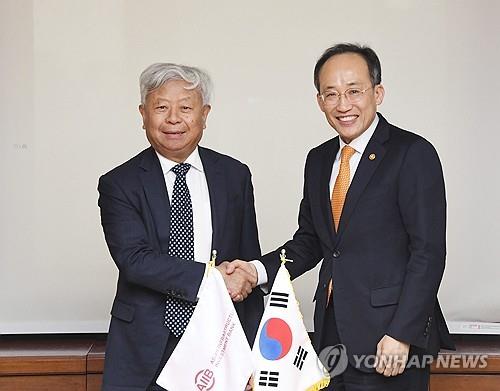- California Assembly OKs highest minimum wage in nation
- S. Korea unveils first graphic cigarette warnings
- US joins with South Korea, Japan in bid to deter North Korea
- LPGA golfer Chun In-gee finally back in action
- S. Korea won’t be top seed in final World Cup qualification round
- US men’s soccer misses 2nd straight Olympics
- US back on track in qualifying with 4-0 win over Guatemala
- High-intensity workout injuries spawn cottage industry
- CDC expands range of Zika mosquitoes into parts of Northeast
- Who knew? ‘The Walking Dead’ is helping families connect
S. Korea, AIIB discuss stronger partnership, new investment chances
South Korea and the China-led Asian Infrastructure Investment Bank (AIIB) discussed ways Monday to boost bilateral cooperation on the financial sector and conduct various joint infrastructure projects, the finance ministry here said.
The discussion took place during the meeting between Finance Minister Choo Kyung-ho and AIIB President Jin Liqun held in Seoul earlier in the day, according to the Ministry of Economy and Finance.
Choo asked for the AIIB chief’s support for South Korean companies seeking investment projects with the AIIB, as well as the promotion of partnership between South Korean financial institutions and the AIIB.
Choo also requested the multilateral lender to expand the employment of South Korean staff, the ministry said.
Jin voiced hope for enhanced bilateral ties in the financial and infrastructure realms and personnel exchanges based on South Korea’s ample experience of economic development and technology capabilities.
The president also expressed gratitude for South Korea’s role in the growth of his organization.
South Korea is the fifth-largest stakeholder of the bank. China is the biggest stakeholder, followed by India, Russia and Germany.
Established in 2016, the AIIB has funded various infrastructure projects aimed at sustainable economic development in the region, and South Korea joined the entity as one of its 57 founding members.
The bank currently has 109 members, representing more than 80 percent of the global population and 65 percent of the global gross domestic product, according to the ministry.
The bank is widely viewed as a counterbalance to U.S.-led multilateral lenders, such as the Asian Development Bank, amid the rising Sino-U.S. rivalry.












